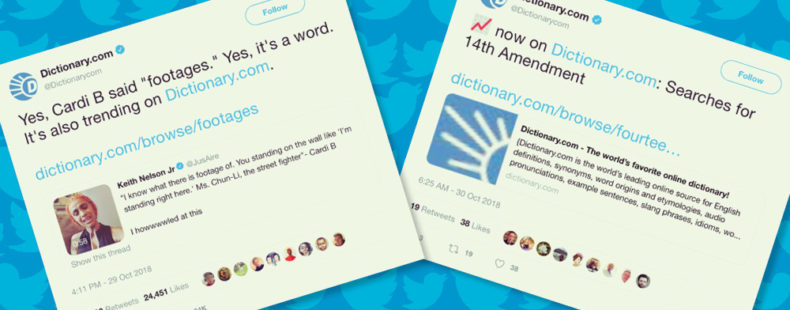Halloween. Cardi B. And, of course, the goings on in Washington D.C. They all had an effect on Dictionary.com’s trending words list for October 26–November 2, 2018. But, how much and what words? Dig in, and find out!
Footages
Convinced Cardi B had made up the word footages in an Instagram video, thousands of fans rushed to Dictionary.com to find out whether the “I Like It” singer had just mangled the English language. Searches for footages rocketed 28,878%. The verdict? Footages is, indeed, a word. Although, footage is typically both the plural and singular form of the word, footages can be used as a plural in some situations. Cardi’s usage, unfortunately, was not one of those situations.
PSA: Just because you can find a word in the dictionary doesn’t mean you’ve used it correctly. pic.twitter.com/qImbJpLPRS
— Dictionary.com (@Dictionarycom) October 31, 2018
Vote for Pedro and Simple Jack
Halloween took the country by storm this week—we even had ghost words haunting Dictionary.com—and so did celebrity Halloween costumes. Riverdale stars Camila Mendes and Lili Reinhart scored a 2,635% spike in searches for the saying Vote for Pedro thanks to their Napoleon Dynamite-inspired Halloween outfits. The saying refers to the campaign slogan of Pedro Sánchez, a shy kid running for class president in the 2004 cult hit film.
Searches were also up for Simple Jack, this time thanks to controversy over snowboarder Shaun White’s decision to dress as the character from the film Tropic Thunder. Because Jack has intellectual disabilities, the character has been criticized as belittling people with disabilities. White was similarly criticized this week for his costume.
In case you missed the whole problem with Simple Jack.https://t.co/SfzNdQnUmp https://t.co/Lel4P3ljnK
— ATW (@ATWDictionary) October 30, 2018
WATCH: What Scares A Dictionary? Ghost Words!
Religiosity
White House advisor Kellyanne Conway is no stranger to the trending words list. In the past, her use of words such as conflate and shiv have spiked searches on the site. This week it was Conway’s assertion that anti-religiosity could be tied to the mass shooting at a Pittsburgh synagogue that sparked a spike in searches for religiosity. The term means “the quality of being religious; piety; devoutness.”
Semitism and Anti-Semitism
The tragedy at the Tree of Life Synagogue in Pittsburgh that claimed the lives of 11 men and women opened up a dialogue about anti-Semitism in America. What does that mean? If you’re wondering, you’re not alone.
Searches for Semitism and anti-Semitism both made meteoric rises over the weekend, remaining high during the week. Semitism refers to “Semitic characteristics, especially the ways, ideas, influence, etc., of the Jewish people,” while anti-Semitism is “discrimination against or prejudice or hostility toward Jews.”
Fourteenth Amendment and birthright
An Axios interview with President Donald Trump was a lightning rod for controversy this week and landed both the Fourteenth Amendment and birthright on our trending words list.
The publication reported Trump “has run the idea of ending birthright citizenship by his counsel and plans to proceed with the highly controversial move,” sending searches for the amendment in question up 2,031% and landing birthright on the list for the very first time. Ratified in 1868, the Fourteenth Amendment defines “national citizenship and forbids the states to restrict the basic rights of citizens or other persons.” A birthright, meanwhile, is defined as “any right or privilege to which a person is entitled by birth.”
📈 now on https://t.co/OeJELgy3YL: Searches for 14th Amendment https://t.co/A8qq4IdHOz
— Dictionary.com (@Dictionarycom) October 30, 2018
Grouty and zonular
This year’s Scrabble World Champion has been crowned, and Nigel Richards did a little teaching along the way.
Searches for zonular and grouty (a variation of one of his winning words: groutier) both climbed this week as diehard fans went in search of the meaning behind Richards’ tiles. Grouty is another word for surly, while zonular is the adjective form of zonule, “a little zone, belt, band, or the like.”
Nemesis
The addition of a Dexter vet to the cast of Gotham had 179% impact on searches for the meaning of nemesis this week. After all, Jaime Murray is now set to play Theresa Walker, a character who’s slated to be Jim Gordon’s main nemesis. The word refers to “an opponent or rival whom a person cannot best or overcome.”
Want to know the difference between enemy and nemesis? Read more here!












